Sep. 21, 2023
Chemicals
Potassium chloride (KCl) fertilizer, often referred to as muriate of potash, is a type of fertilizer that primarily supplies potassium (K) to plants. It plays several essential functions in plant growth and development:
Nutrient Uptake: Potassium is one of the three major macronutrients required by plants, along with nitrogen (N) and phosphorus (P). KCl fertilizer provides plants with a readily available source of potassium, which is crucial for various physiological processes.
Osmotic Regulation: Potassium is involved in the osmotic regulation of plant cells. It helps maintain the proper balance of water within plant cells, preventing wilting during periods of drought and ensuring turgidity and cell structure.
Enzyme Activation: Potassium acts as a cofactor for many enzymes involved in photosynthesis, respiration, and other metabolic processes. It plays a vital role in energy transfer within plant cells.
Nutrient Transport: Potassium facilitates the movement of other nutrients within plants. It helps transport water and essential nutrients from the roots to the rest of the plant, promoting nutrient uptake and distribution.
Stress Tolerance: Adequate potassium levels enhance a plant's ability to withstand environmental stresses such as drought, salinity, and temperature extremes. It helps plants maintain their water balance and overall health during challenging conditions.

Improvement of Fruit Quality: Potassium influences the quality of fruits and vegetables by contributing to fruit size, color, taste, and shelf life. It is particularly important for crops like tomatoes, potatoes, and citrus fruits.
Disease Resistance: Potassium can enhance a plant's resistance to diseases and pests. It promotes the production of compounds that deter herbivores and pathogens.
Stalk and Stem Strength: Potassium plays a role in strengthening plant cell walls, improving stalk and stem strength. This is particularly important for tall or heavy-cropping plants like grains and sugar cane.
Overall Plant Growth: Potassium is essential for the overall growth and development of plants. It contributes to root development, flowering, and seed formation.
In summary, the primary function of KCl fertilizer is to supply potassium, an essential nutrient, to plants. Potassium plays a central role in various physiological processes, including osmotic regulation, enzyme activation, nutrient transport, stress tolerance, and overall plant growth. Proper potassium nutrition is crucial for healthy, vigorous plant growth and optimal crop yield.
If you are interested in sending in a Guest Blogger Submission,welcome to write for us!
All Comments ( 0 )